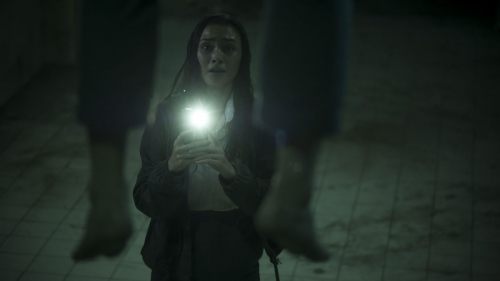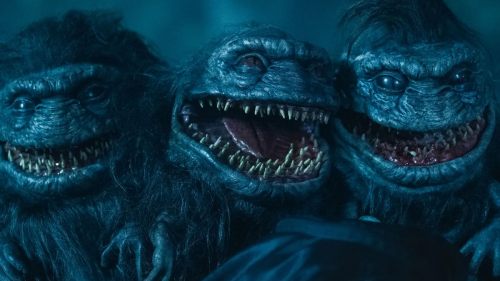Fantasia 2017 Review: ATTRACTION Brings Russian Sci-Fi Into The Young Adult Era
In the English-speaking world, we often consider blockbusters to be the exclusive domain of big American studios. Certainly, that's where the big-budget fare that hits our screens comes from. But blockbusters come from all over; we just don't get to see a lot of them. Blame subtitle-phobic audiences, I guess. It's a shame, too, because entertainment made for mass foreign audiences can tell us a lot about other cultures and even our own.
Enter Attraction, a Russian sci-fi film whose title I'm sure loses a little in translation (a more literal translation of the title is “Gravity”; obviously there's a play on words going on there that we miss out on). A massive hit at the Russian box office,* it's got all the trappings of a modern-day blockbuster - large-scale CGI destruction, interspecies romance, the military, tie-ins with pop stars - it just happens to be set in Moscow.
Grazed by a meteor shower, an alien research vessel comes crashing to Earth, tearing through half of Moscow in the process. Improbably, the careening craft scrapes away the top of a skyscraper to expose protagonist Yulia (Irina Starshenbaum) boning her boyfriend Artyom (Alexander Petrov), both of whom escape their precarious situation only through a miracle of editing. As Yulia’s father, military Colonel Lebedev, endeavours to deal with the alien wreck, Yulia, Artyom, and Artyom’s gang of wayward youths sneak into the containment zone to do wayward things. Naturally, things only go more wayward from there.
Curiously enough, Attraction is less an Independence Day-style war of worlds than a young adult-tinged take on The Day The Earth Stood Still - a film about a single incident, more or less, seen through the eyes of a tight handful of characters, with a moral at the end of it. Though a portion of the running time is devoted to military generals, science labs, and the rest, the story actually belongs to high school student Yulia, douchebag boyfriend Artyom, and the alien (Rinal Mukhametov) they inadvertently rescue while poking around the crash site. Because while he might arrive in a spaceship and exo-suit, Yulia’s new alien friend looks, sounds, and probably fucks like a human - at least, that’s what Yulia hopes.
That romance, told mostly through unconvincing storytelling shortcuts, makes for a weird tonal blend. Breathless love at first sight and fish out of water silliness rob Attraction's sci-fi story of its urgency; it's hard to take an existential threat seriously when there's time to teach the alien to pat dogs and eat pancakes, important though those activities may be. And while it's nice that the film has that sense of occasional levity, its sheer goofiness - as in an unbearable sequence where Yulia and her alien lover attend a concert by real-life popstar Max Korzh - undoes the weightier science fiction concepts it’s trying simultaneously to explore.
When Attraction deigns to delve into its science-fiction and action sides, it delivers, albeit in a surface-level fashion. The design and effects work are top-notch, deployed into dynamic action sequences, and the glimpses we get of the alien home planet are suitably majestic. Its central premise, though - that the aliens long ago discovered the secret of immortality, and forgot how to love in the process - is only examined in about as much depth as it is in this sentence. For a movie with a romance ostensibly at its centre, that’s an odd move, and it robs the characters’ choices of meaning. Rather than fulfilling its potential as an examination on how love and mortality are intertwined, it becomes a pat piece of sentimentality and a too-convenient piece of story spackle. The fifth element is love, indeed.
Coming from Russia, a number of elements in Attraction likely wouldn’t have made it into an equivalent American production. For starters, the Russia-centric plot sees American, NATO, and UN requests for access to the alien vessel denied by the Russian government, while the martial law immediately set up in the wake of the crash is presented as rather efficient indeed - especially when Yulia uses her family connections to bypass police procedure. There’s also a strong streak of popular anti-alien sentiment, which comes to the fore in the third act. When Artyom, taking a spectacularly melodramatic heel turn, leads a mob revolt against the authorities and the aliens, it’s played as broadly as possible, with people braying for revenge against the unwanted visitors. “You should have crashed in Finland,” Yulia observes. Surely this is a statement about Russian attitudes towards foreigners, but the connection is never made explicit.
Attraction is rarely not entertaining, despite a marked slowdown in its second act, but that may be its chief problem. It’s so four-quadrant in its attempts to be both gritty and funny, romantic and action-packed, that it never gets to develop significantly in any particular direction. Its young-adult shenanigans should either have been discarded or made the full focus of the story; as released, it’s a bit of a mishmash. But for Western audiences, Attraction is worth watching simply to see how a different country does this kind of big-budget blowout. Both the similarities and differences to our own blockbusters, each inspired in their own way by American cinema, are truly fascinating - even if the movie itself isn't.
* Fact: 2017’s biggest box-office hit in Russia is Pirates of the Caribbean: Dead Men Tell No Tales. Also, Wonder Woman grossed about half as much in Russia as The Mummy did. Weird.



